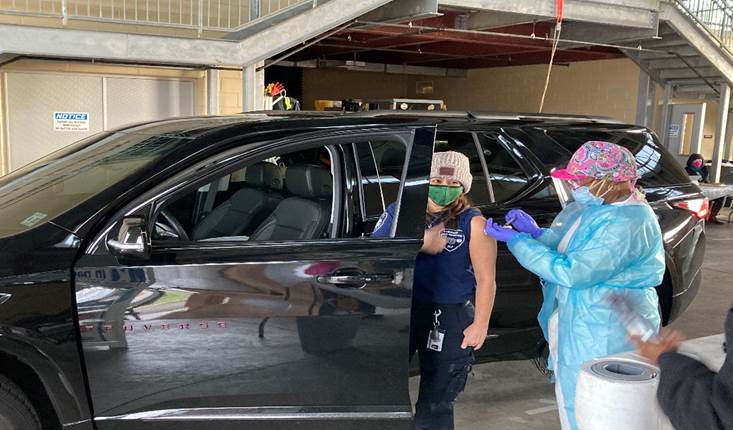By Bert Mandelbaum, MD
In less than a month since the Food and Drug Administration authorized the Pfizer COVID-19 vaccine for children ages 5-11, nearly 1 million youngsters have already received their first shot. The company Moderna is still undergoing clinical trials to determine the effectiveness of its COVID-19 vaccine for this age group and Johnson & Johnson has not yet begun its pediatric clinical trials.
This is tremendous progress in the fight against the virus, as widespread vaccination helps protect people of all ages from getting sick and will help enable children to return to school and other activities safely.
Parents, however, may have questions about the vaccine and should talk with their pediatrician about their concerns and to learn more about the importance of the getting their children vaccinated.
In the meantime, here are answers to some common questions about the vaccine for children ages 5-11.
Why should my child get vaccinated?
Although children are at lower risk of becoming severely ill with COVID-19 compared to adults, they are still at risk.
According to the Centers for Disease Control and Prevention (CDC), as of Nov. 11, 2021, over 6.6 million children in the U.S. have tested positive for COVID-19 since the onset of the pandemic. Of that total, more than 1.9 million cases have occurred in children in the 5-11 age group. Further, the CDC reports 94 COVID-19 associated deaths in children 5–11 during the period January 2020 to Oct. 16, 2021.
COVID-19 cases in children can result in hospitalizations and cause serious complications like multisystem inflammatory syndrome (MIS-C) — a condition where different body parts become inflamed, including the heart, lungs, kidneys, brain, skin, eyes, or gastrointestinal organs.
During a six-week period in late June to mid-August, COVID-19 hospitalizations among children and adolescents increased fivefold, according to the CDC.
Moreover, children can also suffer from “long COVID” in which symptoms can linger for months, and in some situations complications from infection can lead to death.
Vaccination can protect children from the virus and from becoming severely ill should they get infected. As the CDC notes, similar to what was seen in adult vaccine trials, vaccination was nearly 91 percent effective in preventing COVID-19 among children ages 5-11.
Additionally, vaccinating children can help protect family members, including siblings who are not eligible for vaccinations, as well as help keep them in school and enable them to participate in sports, playdates, and other group activities.
Is the vaccine safe?
As stated by the CDC, the Pfizer COVID-19 pediatric vaccine is safe for children. The COVID-19 vaccines have undergone — and will continue to undergo — the most intensive safety monitoring in U.S. history.
Before recommending COVID-19 vaccination for children, scientists conducted clinical trials to study their safety. Scientists found that the benefits of COVID-19 vaccination outweigh the known and potential risks.
Both the CDC and the American Academy of Pediatrics recommend that children ages 5-11 be vaccinated against COVID-19 with the Pfizer-BioNTech pediatric vaccine as soon as possible.
Is the pediatric vaccine different from the vaccine for adolescents and adults?
The pediatric vaccine has the same active ingredients as the vaccine given to adults and adolescents, but the dose is smaller.
While adolescents and adults receive the same dosage, children ages 5-11 receive one third the dosage. Clinical trials found that the lower dose still provides the same level of protection as the adult dose while making it less likely that younger children will experience side effects.
Smaller needles, designed specifically for children, are also used. As with the adult vaccine, children will receive two doses, three weeks apart.
What are the side effects?
The side effects of the COVID-19 vaccine are typically mild and go away in a few days. The most common side effects include:
- Pain, redness, and swelling on the arm where the shot was administered
- Tiredness
- Headache
- Muscle pain
- Chills
- Fever
- Nausea
Some children will not have any side effects at all, and allergic reactions are rare. If your child experiences an allergic reaction after the vaccine (including rapid heartbeat, difficulty breathing, swelling of the throat, or a generalized rash or hives), providers who are onsite when your child receives the shot can rapidly provide care and call for emergency services if needed. If your child receives a COVID-19 vaccine and you think you might be having a severe allergic reaction after leaving the vaccination provider site, seek immediate medical care by calling 911.
Are there any serious health complications from the COVID-19 vaccine?
Serious health events after COVID-19 vaccination are rare, according to the CDC.
The CDC also notes that because the COVID-19 vaccine was recently released, it’s not yet clear if the vaccines will have long-term effects. However, long term effects from vaccines are also rare.
Cases of myocarditis (inflammation of the heart muscle) and pericarditis (inflammation of the outer lining of the heart) have been reported after Pfizer-BioNTech vaccination of children ages 12-17 years. These reactions are rare. In most cases where myocarditis was found, children got better on their own or with minimal treatment and rest.
Moreover, as the American Academy of Pediatrics notes, in the clinical trials of more than 3,000 children ages 5-11, there were no reports of myocarditis from the vaccine.
In addition, myocarditis is a much more common complication from getting sick with the COVID-19 virus than it is from the vaccine.
It’s important to also note that there is no evidence that the vaccine causes fertility problems in adults or children.
Where can my child get the vaccine?
The vaccine should be available through your pediatrician’s office as well as your local pharmacy or health department.
To find a pediatrician with Penn Medicine Princeton Health, call 888-742-7496 or visit www.princetonhcs.org
Bert Mandelbaum, MD, is board certified in pediatrics and chair of the Department of Pediatrics at Penn Medicine Princeton Health.

